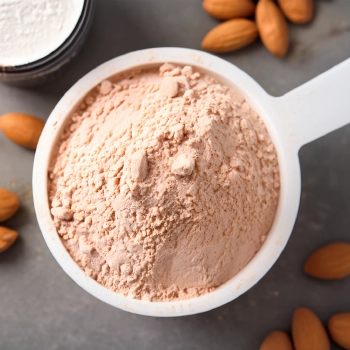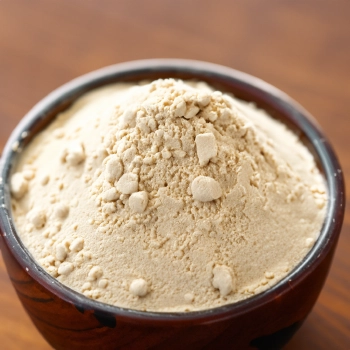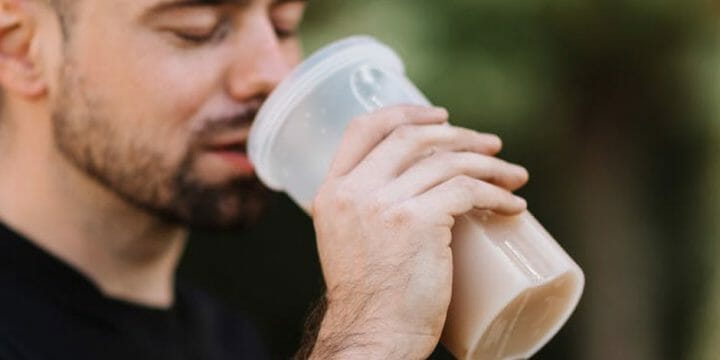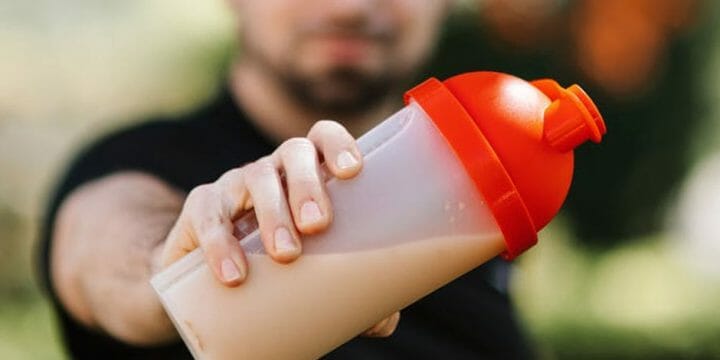Scandals in the fitness industry and a lack of sports nutrition knowledge often lead to misinformation.
As someone who’s trained clients for over a decade, I hear all the fitness gossip. Recently, I heard a rumor that whey protein powder contains steroids.
So, I spent a week digging up information and reviewing various news articles, and, just like with most rumors in the fitness sphere, there was a bit of truth and a lot of lies involved.
Let’s get into it.
Quick Summary
- Protein powder doesn't contain any form of anabolic steroid, and it has been proven by FDA.
- Protein powders typically consist of protein isolate or concentrate, along with sugars, vitamins, minerals, binders, and flavoring, differing significantly from anabolic steroids in composition and function.
- A study from the National Institutes of Health indicates that there's no established link between protein intake and kidney or liver issues, though caution is advised for individuals with pre-existing conditions.
- Considering the misinformation surrounding protein powders and steroids, in my opinion, it's crucial for consumers to educate themselves on the ingredients and benefits of supplements they choose to use.
Do Protein Powders Contain Anabolic Steroids?

No, regular protein powders do not contain anabolic steroids.
When people bring up the false claim that protein powders contain steroids, they’re referring to performance-enhancing drugs like anabolic steroids.
Just because protein powder and anabolic steroids share a common feature — facilitating muscle building — doesn’t make them the same type of substance.
What Are They Actually Made Of?
Having worked closely with nutritionists and supplement manufacturers, I've learned that protein powders usually consist of protein isolate or concentrate, along with sugars, vitamins, minerals, binders, and flavoring.
There are different kinds of protein powders, and each of them is composed of different base protein ingredients:
- Whey protein: According to insights from Medical News Today, most whey protein products — like whey concentrate and isolate — are a mixture of beta-lactoglobulin, alpha-lactalbumin, bovine serum albumin, and immunoglobulins [1].
- Plant protein: Plant-based protein powders are derived from various sources like brown rice, hemp, soy, and pea. They’re a good option for vegans or people with lactose intolerance.
- Casein protein: Like whey supplements, casein is obtained from milk.
- Egg protein: These are made from powdered egg whites.
The processing of powders does not require the addition of any steroids; however, they might support natural hormone production, which includes testosterone and human growth hormone (HGH).
“Whey protein powder is particularly helpful at raising HGH.”
- Dr. Sara Gottfried, MD, Women's Health Expert
Differences Between Protein Supplements and Steroids

In my professional experience, I've seen how anabolic steroids and protein supplements differ significantly.
Composition
Anabolic steroids are synthetic or natural derivates of the male sex hormone testosterone. On the other hand, protein supplements are mainly composed of protein, a macronutrient.
While they both help build muscle, steroids do so by increasing testosterone levels exogenously. Protein builds muscle through muscle-protein synthesis.
Side Effects From Misuse
The dangers of misusing protein supplements result from overly high protein intake or poor supplements.
A study from the National Institutes of Health (NIH) states that although there's no established link between protein intake and kidney or liver issues, individuals with existing conditions affecting these organs might need to limit their protein powder consumption [2].
Also, people with certain conditions shouldn’t take protein supplements. For example, lactose-intolerant people should avoid casein and whey protein products.
According to insights from the study published in the National Institutes of Health (NIH), selecting whey protein isolate could be advantageous as it usually has a very small amount of lactose, or alternatively, picking a whey protein powder that includes lactase, the enzyme that aids in lactose digestion, might be a suitable option [3].
Steroid use and misuse pose severe threats to the human body. Some of these are high blood pressure, heart attacks, kidney failures, testicular cancer, and male sex characteristics in women [4].
Health Benefits
Other than muscle-building, the health benefits of protein supplements may depend on the other ingredients. But generally, optimal protein intake from whichever source, including powders, contributes to better health overall.
Steroids can be used for medical interventions like treating delayed puberty and muscle damage [5] [6].
Why Do Some People Think Protein Powders Contain Steroids?

Some people think protein powders contain steroids because there have been many cases where low-quality protein powder led to health problems in users.
On top of that, some people think the muscle-building effects of protein powder are due to steroids.
Another reason why some might be inclined to believe protein products contain steroids is that there are a few recorded instances of illegal steroids or growth hormones being found in powders.
For example, the FDA from the state of Maharashtra in India recently found traces of steroids in certain brands of protein powders sold to the public [7].
Why Does Picking the Right Supplement Matter?

Picking the right supplement matters because there are many untrusted brands in the fitness industry.
We’ve personally tested each of these products, and our clients have nothing but positive things to say about them:
Many brands try to make a quick buck by adding unnecessary and sometimes dangerous ingredients into their blends.
Here are some of the ingredients you need to watch out for:
- Artificial sweeteners and flavors: Many companies will mask low-quality protein powders with artificial flavoring and sweeteners to distract you from the fact that their product is subpar. Some common ones are sucralose, aspartame, saccharin, neotame, and acesulfame K. In addition to being unnatural, these ingredients may cause headaches, gastric issues, mood swings, and weight gain in some people [8].
- Fillers: Some supplements use fillers — many of which have no nutritional value — to increase the product quantity. Some commonly used ones are magnesium stearate, silicon dioxide, titanium dioxide, starch, microcrystalline cellulose, stearic acid, simethicone, vegetable gum, talc, and propylene glycol.
- Thickeners and gum: These are usually manufactured from wheat, corn, and soy. They can cause gas and bloating in some people.
- Fats and vegetable oil: These ingredients are usually added to whey protein powders to increase their richness. However, many of them are derived from processed and hydrogenated sources that contain unhealthy trans fats.
Many of these ingredients can negatively affect the quality of your protein, cause unpleasant side effects, and ultimately backtrack your fitness journey.
Go for a protein powder that contains all-natural ingredients, preferably one sold by a trusted brand.
FAQs
Can Someone On An Anabolic Steroid Cycle Consume Protein Powders?
Yes, someone on an anabolic steroid cycle may consume protein powder as part of the supplementation. In fact, steroid users require more protein than natural lifters because they have an elevated rate of protein synthesis.
Taking steroids can also increase how much protein your body can use to build muscle.
What Supplements Contain Steroids?
Certain supplements like creatine, ginseng, ashwagandha, DAA, zinc, magnesium, DHEA, 5-alpha-hydroxy-laxogenin, and many others contain “natural steroids”.
These compounds aren’t illegal substances and don’t carry the same physical or psychological side effects as illegal steroids. They are deemed “natural steroids” because of their contribution to hormonal health and muscle building.
How Much Protein Should an Average Person Take to Build Muscle?
An average person should take 1.2-2.2 grams of protein per kilogram of body weight per day to build muscle (from 0.5g to 1g of protein per pound of body weight).
This range can vary depending on your body composition. Elite athletes usually take 1–2 grams per kilo of body weight.
References:
- https://www.medicalnewstoday.com/articles/263371
- https://www.ncbi.nlm.nih.gov/pmc/articles/PMC1262767/
- https://www.ncbi.nlm.nih.gov/pmc/articles/PMC6669050/
- https://www.nhs.uk/conditions/anabolic-steroid-misuse/
- https://www.ncbi.nlm.nih.gov/pmc/articles/PMC1030008/
- https://www.news-medical.net/health/Taking-Anabolic-Steroids-After-a-Sport-Injury.aspx
- https://www.hindustantimes.com/pune-news/steroids-in-muscle-building-protein-powders-fda-pune-orders-statewide-checks/story-biEiAkl4t0a6QFEc0CYmLL.html
- https://www.bmj.com/content/378/bmj-2022-071204
About The Author
You May Also Like






